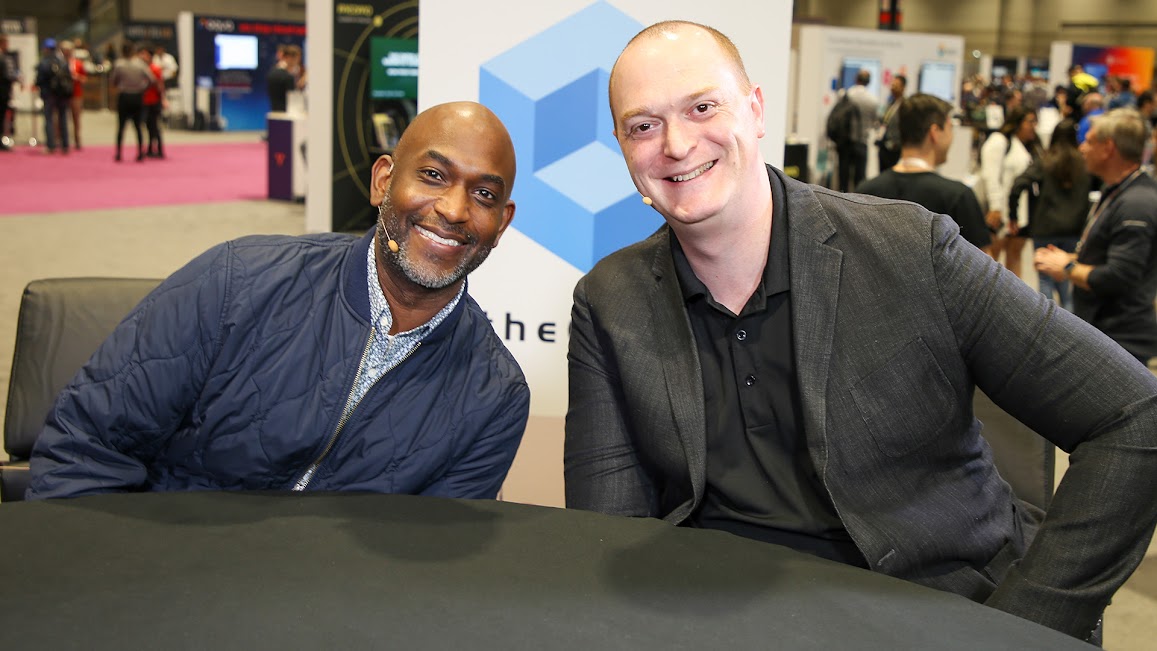 CLOUD
CLOUD
 CLOUD
CLOUD
 CLOUD
CLOUD
Could the laptop soon replace the cloud as the preferred development environment for enterprise coders?
That possibility was set forth by software engineer and developer advocate Kelsey Hightower in a late October post that has received nearly 700,000 views to date and sparked a spirited online debate. Hightower’s comment noted that faster, more powerful processors could lead to more value for development on local machines.
“You can just see the benchmarks going up and up … faster, more cores, GPUs locally,” Hightower (pictured, left), said in an appearance on theCUBE, SiliconANGLE Media’s livestreaming studio. “I said if hardware continues at this trajectory, remote dev environments are going to be less appealing to developers. I want that fancy database on my desktop where I’m actually writing my code.”
Hightower spoke with theCUBE industry analyst John Furrier at KubeCon + CloudNativeCon NA, during an exclusive broadcast. He was joined by Rob Whiteley (right), chief executive officer at Coder Technologies Inc., and they discussed the future direction of development environments and rising innovation in the enterprise software industry. (* Disclosure below.)
There is plenty of evidence that major players in the laptop industry are continuing to integrate more advanced products into their offerings. Apple Inc.’s newest Macs have powerful, internally developed chips based on Arm designs, and Microsoft Corp. has expressed interest in equipping processors with advanced AI features for its PC portfolio. Yet there may be limitations on how far this can go for developers, especially in large organizations, according to Whiteley.
“I do think it only makes sense for small or individual developers,” he said. “If you’re a bank and you have 10,000 developers or 25,000 developers, never mind the cost of shipping $3,000 MacBooks. You’re not going to be able to support … VMware Workstation and Docker and all the tools that are needed to have that kind of robust environment, whereas I can centralize that in the cloud.”
One potential deterrent for developers interested in using their laptops for development is security. Many enterprise network-connected devices now come with a mass of security tools that can slow work significantly. This has led developers to seek new approaches for testing code.
“I think there has to be a way to develop safely,” Hightower said. “No developer I’ve ever met wants production data on their laptop … give me the data that represents production. I want the ability to create the same schema on my laptop and can I not get a snapshot of scrub data that I can now test locally? You’ve got things like test containers because developers are stepping up.”
Despite the challenges presented to developers in testing environments, both executives noted that companies are more willing to embrace innovation and support open-source projects that will benefit the software community as a whole.
“There’s an innovator mindset that’s back,” Whiteley said. “I’m seeing that enterprises are willing to, because they can wrap guardrails around it, enable that innovation without having to stifle it, which they were five years ago.”
This is also leading to greater collaboration, according to Hightower, as businesses realize that a shared model will likely yield a higher level of success than the creation of walled gardens.
“If you don’t have a company that can collaborate with the rest of the industry, you will be left behind,” Hightower said. “We know what the blueprint is. Talented people not only choose the best tools, they create them … and they share them with each other. A developer goes on stage and says, ‘Hey, we all have this problem. Here’s how I solved it.’ It’s available on GitHub three months later, and they’re getting their A round and they have a booth at KubeCon. That is now the pace of the way this works.”
Here’s the complete video interview, part of SiliconANGLE’s and theCUBE’s coverage of KubeCon + CloudNativeCon NA:
(* Disclosure: Coder Technologies sponsored this segment of theCUBE. Neither Coder Technologies nor other sponsors have editorial control over content on theCUBE or SiliconANGLE.)
Support our mission to keep content open and free by engaging with theCUBE community. Join theCUBE’s Alumni Trust Network, where technology leaders connect, share intelligence and create opportunities.
Founded by tech visionaries John Furrier and Dave Vellante, SiliconANGLE Media has built a dynamic ecosystem of industry-leading digital media brands that reach 15+ million elite tech professionals. Our new proprietary theCUBE AI Video Cloud is breaking ground in audience interaction, leveraging theCUBEai.com neural network to help technology companies make data-driven decisions and stay at the forefront of industry conversations.